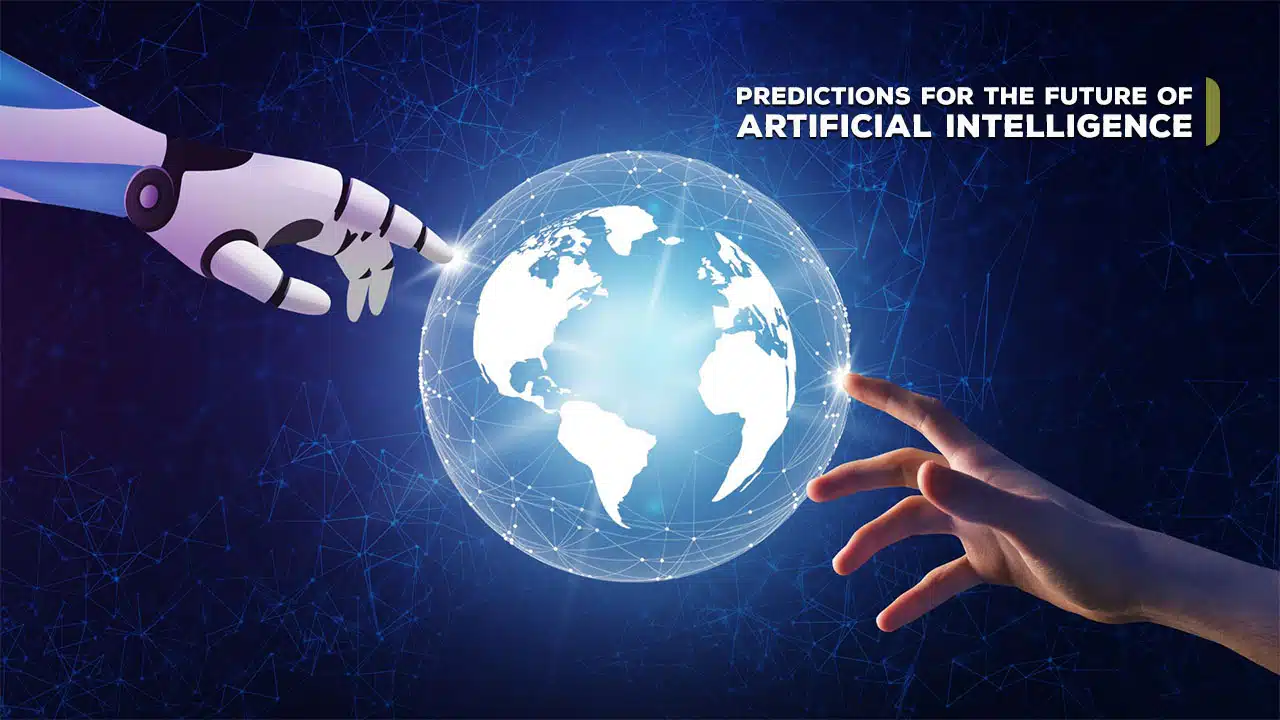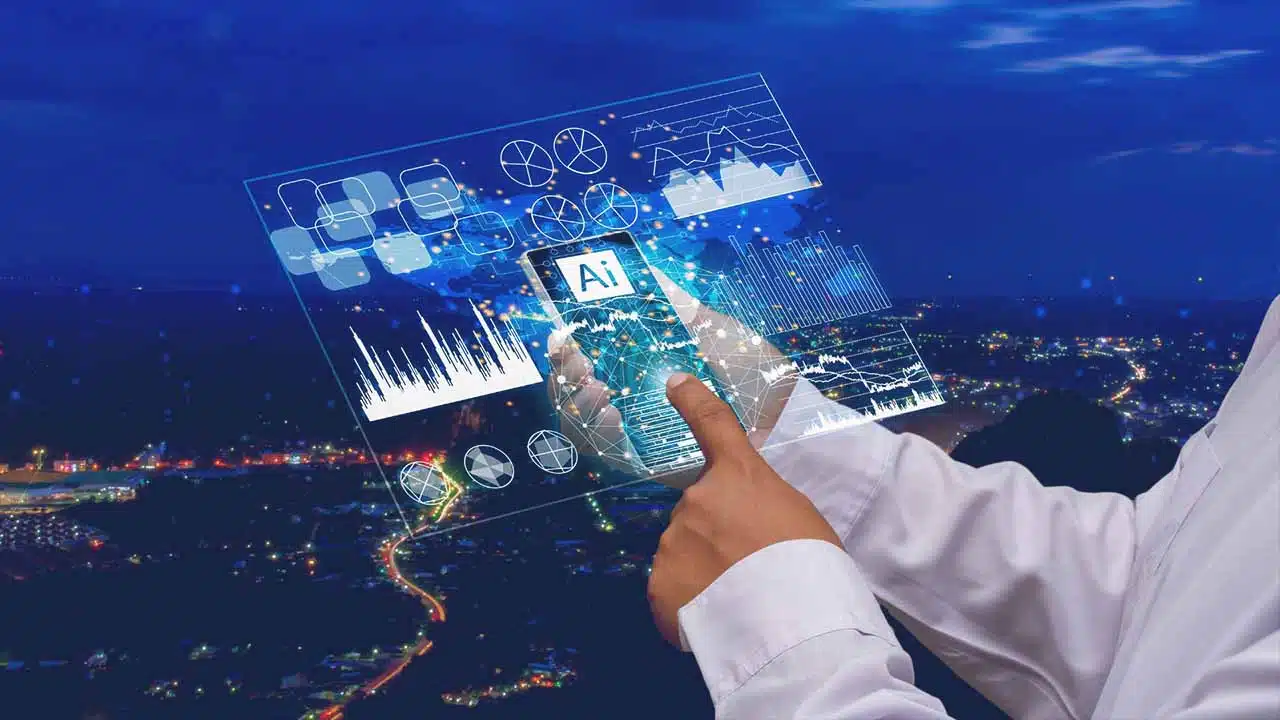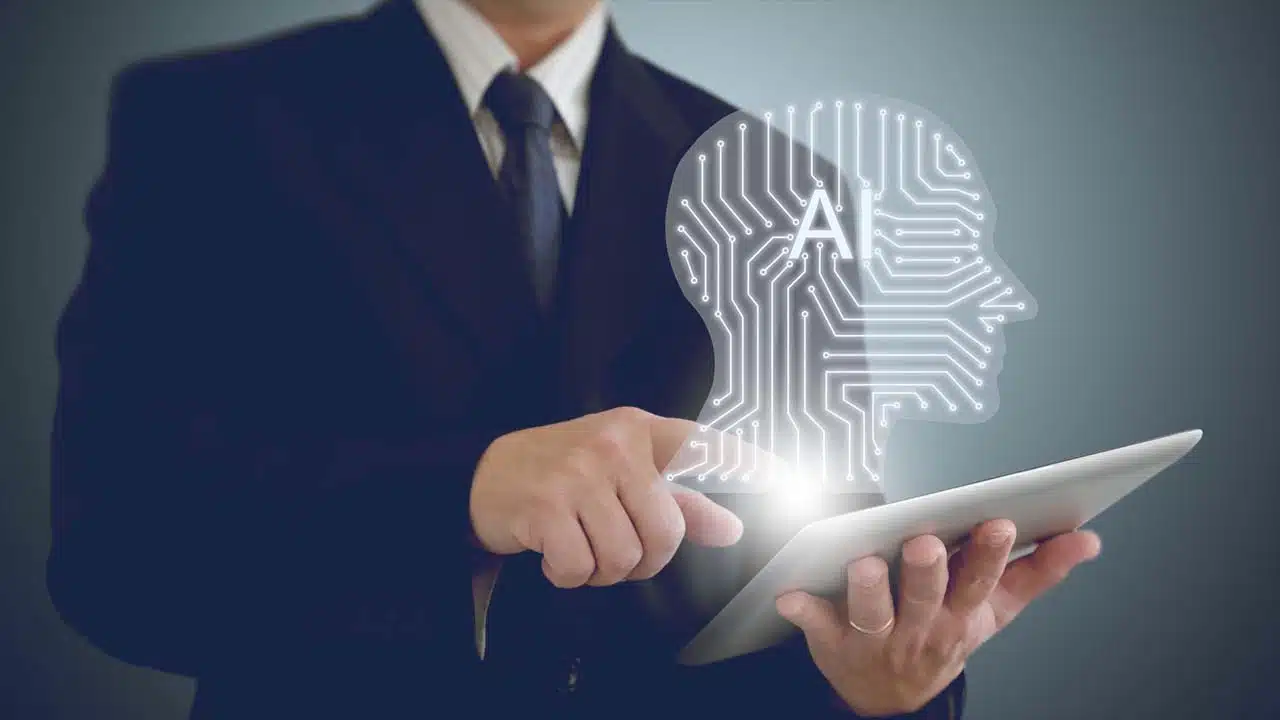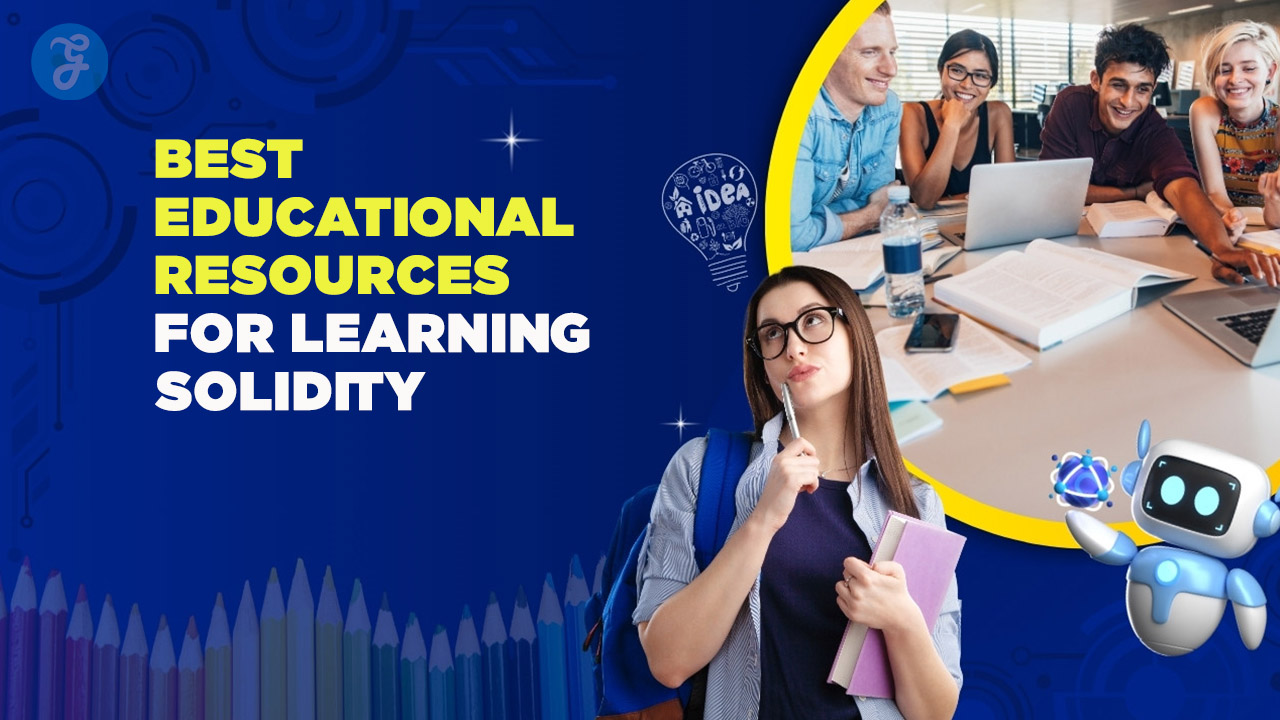As we stand on the precipice of what many call the Fourth Industrial Revolution, artificial intelligence is poised to transform our world in ways we can scarcely imagine. From the smartphones in our pockets to the algorithms that power global financial markets, AI is already woven into the fabric of our daily lives.
But today’s AI is just the tip of the iceberg. The coming decades promise advancements that could reshape every aspect of human society, from how we work and learn to how we diagnose diseases and explore the cosmos.
In this article, we’ll embark on a journey into the future of AI, exploring expert predictions, potential breakthroughs, and the profound implications these developments could have on our world.
We’ll examine how AI might evolve across various sectors, from healthcare and education to transportation and the workplace. We’ll also grapple with these advancements’ ethical considerations and potential risks. So, fasten your seatbelts and prepare for a thrilling exploration of the future of artificial intelligence.
The Current State of AI
Before we leap into the future, let’s ground ourselves in the present. Today’s AI landscape is dominated by what’s known as narrow or weak AI—systems designed to perform specific tasks within a limited domain.
These AIs excel at pattern recognition, data analysis, and optimization problems. They power the voice assistants on our phones, the recommendation systems on our streaming platforms, and the fraud detection algorithms that protect our bank accounts.
In more specialized fields, AI is making significant strides:
- In healthcare, AI systems assist in medical imaging analysis, helping detect diseases like cancer at earlier, more treatable stages.
- In finance, AI-powered algorithms execute trades at speeds and volumes impossible for human traders while also detecting fraudulent transactions with increasing accuracy.
- In automotive engineering, AI is the brain behind self-driving car prototypes, processing vast amounts of sensory data to navigate complex road conditions.
- In language technology, AI models can now translate between hundreds of languages in real-time and generate human-like text on a wide range of topics.
These applications, while impressive, still fall under the category of narrow AI. The holy grail of AI research—Artificial General Intelligence (AGI) or “strong” AI—remains on the horizon.
AGI would represent a system with human-like general intelligence capable of reasoning, planning, and problem-solving across diverse domains. While AGI remains theoretical, the rapid pace of AI advancement has many experts speculating about its eventual emergence.
Predictions for the Future of AI
1. Advancements in Machine Learning
1. Deep Learning Breakthroughs
Deep learning, a subset of machine learning inspired by the structure and function of the human brain, has been at the forefront of recent AI breakthroughs. Experts predict several exciting developments in this field:
- More efficient training methods: Current deep learning models often require massive amounts of data and computational power for training. Future breakthroughs may lead to models that can learn effectively from smaller datasets, making AI more accessible and energy-efficient.
- Improved interpretability: One of the main criticisms of deep learning is the “black box” nature of its decision-making. Future models are expected to offer greater transparency, allowing humans to understand and trust the reasoning behind AI decisions.
- Enhanced transfer learning: Future AI systems may better apply knowledge gained in one domain to new, unrelated tasks—much like humans do. This could lead to more flexible and adaptable AI systems.
- Neuromorphic computing: Advancements in hardware designed to mimic the structure of the human brain could lead to more efficient and powerful deep learning systems.
2. Unsupervised and Self-Supervised Learning
While current AI systems often rely on labeled data for training, the future of AI is likely to see a shift towards unsupervised and self-supervised learning:
- Learning from raw data: Future AI systems may be able to discover patterns and extract knowledge from vast amounts of unlabeled data, similar to how humans learn through observation.
- Curiosity-driven learning: AI models might develop internal reward systems that drive them to explore and learn about their environment, leading to more autonomous and adaptable systems.
- Few-shot learning: Advanced AI could learn new tasks from just a few examples, dramatically reducing the data needed for training.
These advancements could lead to AI systems that are more flexible, require less human intervention, and can operate effectively in novel environments.
2. AI in Healthcare
1. Personalized Medicine
The integration of AI in healthcare is expected to usher in an era of truly personalized medicine:
- Genomic analysis: AI systems can analyze an individual’s genetic data quickly and accurately, identifying potential health risks and suggesting preventive measures.
- Drug discovery and development: AI-powered systems could dramatically speed up the process of identifying potential new drugs and predicting their effects, potentially reducing the time and cost of bringing new treatments to market.
- Personalized treatment plans: By analyzing a patient’s genetic profile, medical history, lifestyle factors, and even real-time health data from wearable devices, AI could generate highly personalized treatment plans optimized for individual patients.
- Predictive healthcare: Advanced AI systems might be able to predict health issues before they occur, allowing for early intervention and prevention.
2. AI-Assisted Surgery
The future of surgery is likely to be shaped by AI in several ways:
- Surgical planning: AI systems could analyze medical imaging data to plan optimal surgical approaches, considering individual patient anatomy and minimizing risks.
- Robotic surgery: AI-powered surgical robots may be able to perform specific procedures with greater precision than human surgeons, potentially reducing complications and improving outcomes.
- Real-time guidance: During surgery, AI systems could provide real-time analysis of medical imaging, vital signs, and other data to guide surgeons and alert them to potential complications.
- Post-operative care: AI could assist in monitoring patients after surgery, predicting potential complications, and recommending interventions.
These advancements could lead to safer surgeries, faster recovery times, and better patient outcomes.
3. AI in Transportation
1. Autonomous Vehicles
While self-driving cars are already being tested on roads, the future promises even more advanced autonomous transportation:
- Fully autonomous vehicles: Within the next few decades, we may see cars operating without human intervention under all driving conditions.
- Connected vehicle ecosystems: Autonomous vehicles will likely communicate with each other and intelligent infrastructure, creating a coordinated transportation system that optimizes traffic flow and reduces accidents.
- Multi-modal autonomous transport: Beyond cars, we may see self-driving trucks, buses, and even flying taxis, all coordinated by AI systems.
- Ethical decision-making: Advanced AI will need to be capable of making split-second ethical decisions in potential accident scenarios, raising complex philosophical and practical questions.
2. Smart Infrastructure
AI will play a crucial role in developing smart cities and infrastructure:
- Intelligent traffic management: AI systems could analyze real-time data from sensors and cameras to optimize traffic light timing, suggest route changes, and manage public transportation schedules.
- Predictive maintenance: AI could monitor the condition of roads, bridges, and other infrastructure, predicting when maintenance is needed before visible signs of wear appear.
- Energy optimization: Smart grids powered by AI could balance energy supply and demand in real-time, integrating renewable energy sources more efficiently.
- Urban planning: AI could assist in designing more efficient and livable cities by simulating the impacts of different urban development scenarios.
These advancements could lead to more efficient, sustainable, and livable urban environments.
4. AI in Education
1. Personalized Learning
AI has the potential to revolutionize education by providing truly personalized learning experiences:
- Adaptive learning systems: AI-powered platforms could adjust in real-time to a student’s performance, focusing on areas where they need more practice and moving quickly through material they’ve mastered.
- Intelligent tutoring systems: AI tutors could provide one-on-one instruction tailored to each student’s learning style, pace, and interests.
- Emotional intelligence in education: Advanced AI might detect a student’s emotional state and engagement level, adjusting the learning experience accordingly.
- Virtual and augmented reality: AI could power immersive learning experiences, allowing students to interact with complex concepts in 3D space or simulate historical events.
2. Automated Assessment and Feedback
AI systems are expected to take over more routine tasks in education:
- Natural language processing for essay grading: AI could provide instant, detailed feedback on written assignments, analyzing not just grammar and style but also the strength of arguments and the use of evidence.
- Continuous assessment: Rather than relying on periodic tests, AI systems could continuously assess student understanding, providing a more accurate and up-to-date picture of student progress.
- Plagiarism detection: Advanced AI could detect copied text and identify paraphrased content and similar ideas expressed in different words.
- Personalized feedback: AI could generate detailed, individualized feedback on assignments, highlighting areas for improvement and suggesting personalized resources for further study.
These advancements could free teachers to focus on higher-level instruction and mentoring while providing students with more immediate and personalized feedback.
5. AI in the Workplace
1. Automation and Augmentation
AI will continue to automate routine tasks while also augmenting human capabilities:
- Intelligent process automation: AI systems will take over more complex, rule-based tasks across various industries, from data entry and analysis to customer service and quality control.
- Collaborative robots (cobots): Advanced AI will power robots that can work safely alongside humans, adapting to new tasks and environments with minimal programming.
- AI-enhanced creativity: In fields like design, music, and writing, AI tools will augment human creativity, suggesting ideas and handling routine aspects of creative work.
- Predictive maintenance in industry: AI systems will monitor equipment in real-time, predicting failures before they occur and optimizing maintenance schedules.
2. AI in Decision Making
AI is expected to play an increasing role in business decision-making:
- Strategic planning: AI systems could analyze vast amounts of market data, economic indicators, and company performance metrics to suggest optimal business strategies.
- Risk assessment: AI could provide more accurate risk assessments by analyzing complex data patterns in fields like insurance and lending.
- Supply chain optimization: AI could manage global supply chains in real-time, predicting demand, optimizing inventory, and adapting to disruptions.
- Personalized marketing: AI will enable hyper-personalized marketing campaigns, tailoring messages and offers to individual consumers based on their behavior and preferences.
These developments could lead to more data-driven, efficient, and responsive businesses.
6. Ethical AI and Governance
1. AI Ethics and Bias Mitigation
As AI becomes more prevalent and influential, addressing ethical concerns will be crucial:
- Fairness in AI: Researchers are working on techniques to detect and mitigate bias in AI systems, ensuring they make fair decisions across different demographic groups.
- Explainable AI: Future AI systems are expected to be able to explain their decision-making processes in ways that humans can understand and audit.
- Privacy-preserving AI: Techniques like federated learning and differential privacy may allow AI systems to learn from data without compromising individual privacy.
- Ethical decision-making frameworks: AI systems may be developed with built-in ethical frameworks, allowing them to make decisions that align with human values.
2. AI Governance and Regulation
The future will likely see more comprehensive governance frameworks for AI:
- International cooperation: Countries may work together to establish global AI development and deployment standards.
- Sector-specific regulations: Different industries like healthcare and finance may develop specialized AI regulations to address their unique challenges and risks.
- AI auditing: Third-party organizations may emerge to audit AI systems for safety, fairness, and compliance with regulations.
- Public engagement: Governments and organizations may involve the public more in AI policy and ethics discussions.
These developments will ensure that AI technologies are developed and deployed responsibly.
The Path to Artificial General Intelligence (AGI)
While opinions vary on when (or if) we’ll achieve AGI, many experts believe significant progress will be made in the coming decades:
- Cognitive architectures: Researchers may develop AI systems that more closely mimic the structure and function of the human brain, including aspects like memory, reasoning, and learning.
- Meta-learning: Future AI systems may be able to learn how to learn and become more efficient at acquiring new skills and knowledge.
- Artificial consciousness: Some researchers are exploring the possibility of creating AI systems with self-awareness and subjective experiences, though this remains highly speculative.
- Integration of symbolic AI and neural networks: Future systems may combine the logical reasoning capabilities of symbolic AI with the pattern recognition strengths of neural networks.
The development of AGI would represent a fundamental shift in artificial intelligence capabilities with profound implications for society.
Potential Impacts and Challenges
The rapid advancement of AI technology brings both exciting opportunities and significant challenges:
1. Economic Impact
- Job displacement: Automation powered by AI could lead to significant job losses in specific sectors, particularly those involving routine cognitive or manual tasks.
- New job creation: At the same time, AI is expected to create new job categories, particularly in fields related to AI development, maintenance, and human-AI interaction.
- Economic growth: Increased productivity due to AI could lead to significant economic growth, potentially creating more wealth and raising questions about its distribution.
- Shift in skills demand: The workforce of the future may need to emphasize skills that are complementary to AI, such as creativity, emotional intelligence, and complex problem-solving.
2. Social Impact
- Changes in social interactions: As AI becomes more integrated into our daily lives, it may change how we interact with each other and technology.
- Educational transformation: AI could democratize access to high-quality education but may also widen the gap between those with and without access to advanced AI tools.
- Healthcare revolution: AI could lead to better health outcomes and longer lifespans but may also raise issues of healthcare equity and data privacy.
- Altered perception of intelligence: As AI capabilities grow, our understanding of what constitutes intelligence and the unique value of human cognition may change.
3. Existential Risks
- Superintelligent AI: Some experts worry about the potential development of AI systems that surpass human intelligence in all domains, which could pose existential risks if not aligned with human values.
- Autonomous weapons: The development of AI-powered autonomous armaments raises serious ethical concerns and could destabilize global security.
- Overdependence on AI: As we rely more on AI systems, we may become vulnerable to large-scale disruptions if these systems fail or are compromised.
Takeaway
As we’ve explored in this deep dive into the future of Artificial Intelligence, we stand on the brink of a technological revolution that promises to reshape our world profoundly. From personalized medicine and AI-powered education to autonomous transportation and smarter cities, the potential applications of advanced AI are as diverse as they are transformative.
The journey ahead is filled with both thrilling possibilities and sobering challenges. AI can potentially solve some of humanity’s most pressing problems, from climate change to disease.
It could usher in unprecedented productivity and creativity, freeing humans from routine tasks and augmenting our capabilities in ways we can scarcely imagine. At the same time, the rise of AI raises complex ethical questions and potential risks that we must grapple with as a society.
As we move into this AI-driven future, it will be crucial to approach these developments with enthusiasm and caution. We must invest in AI research and development while prioritizing ethics, safety, and equitable access.
We need to prepare for the economic and social changes AI will bring, ensuring that the benefits of this technology are shared broadly across society.
The future of AI is not predetermined. It will be shaped by the choices we make today and in the years to come. By fostering interdisciplinary collaboration, engaging in public dialogue about the role of AI in society, and developing robust governance frameworks, we can steer the development of AI in a direction that enhances human flourishing and addresses global challenges.
The future of Artificial Intelligence is not just about technological advancement—it’s about shaping a future that amplifies human potential, upholds our values, and improves lives globally.
As we stand on the threshold of this new era, let’s embrace the possibilities while thoughtfully navigating the challenges, working together to create a future where AI is a powerful tool for human progress and well-being.







































